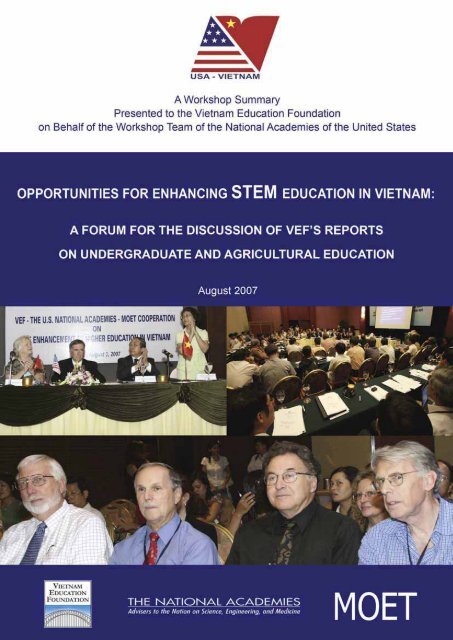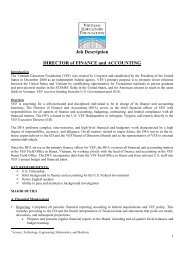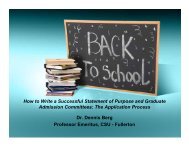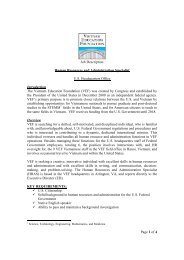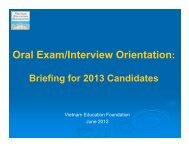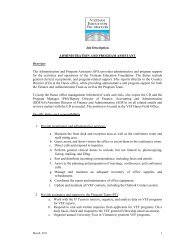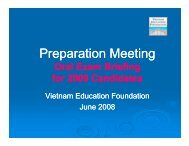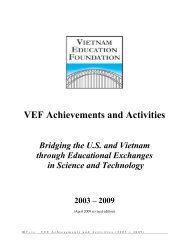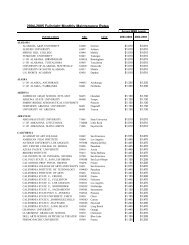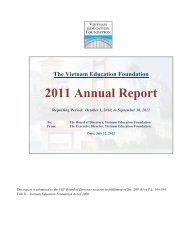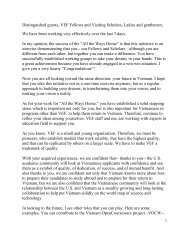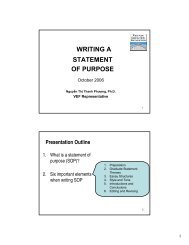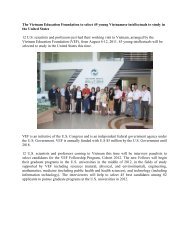Vietnam Education Foundation
Vietnam Education Foundation
Vietnam Education Foundation
You also want an ePaper? Increase the reach of your titles
YUMPU automatically turns print PDFs into web optimized ePapers that Google loves.
OPPORTUNITIES<br />
FOR ENHANCING STEM * EDUCATION IN VIETNAM:<br />
A Forum for the Discussion of VEF’s Reports<br />
on Undergraduate and Agricultural <strong>Education</strong><br />
A Workshop Summary<br />
Presented to the <strong>Vietnam</strong> <strong>Education</strong> <strong>Foundation</strong><br />
on Behalf of the Workshop Team of the National Academies of the United States<br />
August 2007<br />
* STEM stands for Science, Technology, Engineering and Mathematics.
Workshop Facilitators and Session Leaders<br />
Dr. H. Ray Gamble<br />
Director, Fellowships Office<br />
National Academy of Sciences<br />
Dr. Peter J. Gray<br />
Director of Academic Assessment<br />
Faculty Enhancement Center<br />
United States Naval Academy<br />
Dr. John E. Hopcroft<br />
Computer Science Department<br />
Cornell University<br />
Dr. Lynne McNamara<br />
Deputy Executive Director<br />
<strong>Vietnam</strong> <strong>Education</strong> <strong>Foundation</strong><br />
Dr. Nguyen Thi Thanh Phuong<br />
Country Director<br />
<strong>Vietnam</strong> <strong>Education</strong> <strong>Foundation</strong><br />
Dr. Isaac F. Silvera<br />
Thomas Dudley Cabot Professor of the Natural Sciences<br />
Lyman Laboratory of Physics<br />
Harvard University<br />
Dr. Neal Van Alfen, Dean<br />
College of Agriculture and Environmental Sciences<br />
University of California, Davis<br />
Workshop Discussants<br />
Dr. Tran Van Nhung<br />
Vice Minister, Ministry of <strong>Education</strong> and Training<br />
Dr. Nguyen Thi Le Huong<br />
Deputy Director, Higher <strong>Education</strong> Department<br />
Ministry of <strong>Education</strong> and Training<br />
Workshop Summary Author<br />
Dr. Margaret Petrochenkov<br />
Staff Officer, Fellowships Office<br />
National Academy of Sciences<br />
1
TABLE OF CONTENTS<br />
Acknowledgements ........................................................................................................... 3<br />
Summary............................................................................................................................ 4<br />
Appendix I ......................................................................................................................... 9<br />
Observations on Undergraduate <strong>Education</strong> in Computer Science, Electrical<br />
Engineering, and Physics at Select Universities in <strong>Vietnam</strong>..................................... 9<br />
Executive Summary.................................................................................................. 10<br />
Conclusions............................................................................................................... 14<br />
Appendix II...................................................................................................................... 17<br />
Observations on the Current Status of <strong>Education</strong> in the Agricultural Sciences<br />
in <strong>Vietnam</strong>.................................................................................................................... 17<br />
Executive Summary.................................................................................................. 18<br />
Conclusions............................................................................................................... 18<br />
Appendix III ....................................................................................................................20<br />
Workshop Agenda ........................................................................................................ 20<br />
Appendix IV .................................................................................................................... 23<br />
Short Bios for the Workshop Facilitators ..................................................................... 23<br />
Appendix V......................................................................................................................26<br />
List of Workshop Participants and Contributors .......................................................... 26<br />
Appendix VI .................................................................................................................... 31<br />
Workshop Evaluation Summary................................................................................... 31<br />
2
Acknowledgements<br />
This report summarizes the workshop entitled “Opportunities for Enhancing STEM<br />
<strong>Education</strong> in <strong>Vietnam</strong>: A Forum for the Discussion of VEF’s Reports on Undergraduate<br />
and Agricultural <strong>Education</strong>,” which the <strong>Vietnam</strong> <strong>Education</strong> <strong>Foundation</strong> (VEF) and the<br />
Ministry of <strong>Education</strong> and Training of <strong>Vietnam</strong> (MOET) sponsored. The workshop took<br />
place on August 2-3, 2007, at the Sofitel Plaza Hotel in Hanoi, <strong>Vietnam</strong>. Over 100<br />
participants attended, including representatives from MOET and <strong>Vietnam</strong>ese universities<br />
as well as VEF staff, National Academies’ staff, and members of the National Academies<br />
Workshop Team.<br />
The National Academies (NA) organized a team of workshop facilitators who all<br />
participated in one of the previous Site Visits. The meeting’s goal was to identify<br />
additional approaches and strategies to improve higher education in <strong>Vietnam</strong>. The VEF<br />
and the NA are grateful to Dr. Peter J. Gray, Dr. John Hopcroft, Dr. Isaac Silvera, and Dr.<br />
Neal van Alfen, for dedicating their time and expertise to these issues during two separate<br />
trips to <strong>Vietnam</strong>.<br />
Deputy Prime Minister Dr. Nguyen Thien Nhan, Vice Minister Dr. Tran Van Nhung,<br />
First Vice Minister Dr. Banh Tien Long, Dr. Nguyen Thi Le Huong, Deputy Director<br />
General, Department of Higher <strong>Education</strong>, and many others at MOET provided<br />
invaluable support. The Executive Director of VEF, Dr. Vo Van Toi, the Deputy<br />
Executive Director, Dr. Lynne McNamara, Country Director of VEF, Dr. Nguyen Thi<br />
Thanh Phuong, and the entire VEF staff provided the logistics, organization, and support<br />
that contributed to the workshop’s success.<br />
Finally, we express sincere appreciation to the Public Affairs Section, U.S. Embassy<br />
Hanoi, for authorizing the use of the bi-national logo, representing the United States and<br />
<strong>Vietnam</strong>, on the cover of this workshop summary.<br />
3
Summary<br />
Site Visit Teams of the National Academies authored two reports on the current status of<br />
higher education in <strong>Vietnam</strong>. The first, Observations on Undergraduate <strong>Education</strong> in<br />
Computer Science, Electrical Engineering, and Physics at Select Universities in <strong>Vietnam</strong>,<br />
focused on three disciplines at four premier <strong>Vietnam</strong>ese institutions and was released in<br />
August 2006. The second, Observations on the Current Status of <strong>Education</strong> in the<br />
Agricultural Sciences in <strong>Vietnam</strong>, followed from site visits to four <strong>Vietnam</strong>ese<br />
agricultural universities, and appeared in January 2007. VEF widely distributed these<br />
publications in <strong>Vietnam</strong> to professors, administrators, researchers, and MOET.<br />
Workshop participants received electronic copies of these publications in English as well<br />
as in <strong>Vietnam</strong>ese in advance of the meeting. All participants on site received the<br />
Executive Summary and Conclusions of the first report (Appendix I), and the Executive<br />
Summary and Conclusions of the second report (Appendix II). The full reports are<br />
available at the VEF website (www.vef.gov) both in English and in <strong>Vietnam</strong>ese.<br />
After Dr. Vo Van Toi, the Executive Director of VEF, welcomed all workshop<br />
participants, Dr. Nguyen Thi Thanh Phuong, Country Director of VEF, began the<br />
Workshop with a briefing on the undergraduate education report. She outlined the Site<br />
Visit Team’s observations on undergraduate programs in computer science, electrical<br />
engineering, and physics and underlined five problem areas that the team identified in the<br />
<strong>Vietnam</strong>ese educational system: undergraduate teaching and learning, undergraduate<br />
curriculum and courses, instructors, graduate education and research, and the evaluation<br />
of student learning outcomes and institutional effectiveness.<br />
The Site Visit Team made recommendations, which include the following. <strong>Vietnam</strong><br />
needs to increase the number of universities as well as the number of faculty members.<br />
Universities should require local institutional autonomy and a system of program review<br />
and accreditation. Faculty and students need access to online journals, research data, and<br />
other public information electronically. Faculty members need to develop professionally,<br />
which could be facilitated by reducing their course load. The MOET-mandated<br />
curriculum needs revision and reorganization, including a reduction in the number of<br />
required courses. Universities should include fundamental and basic research in their<br />
organizational structure. The Site Visit Team also suggested a focus on improving<br />
teaching methods in high school, and encouraged these students to choose a college<br />
major before graduation.<br />
Dr. H. Ray Gamble of the National Academies then summarized the findings of the<br />
agricultural education report. This Site Visit Team observed many of the same problems<br />
and issues already cited. Additionally, the Agriculture Site Visit Team suggested<br />
comprehensive rather than over-specialized education for students in agriculture.<br />
Furthermore, while reiterating the need to integrate research and teaching at educational<br />
institutions, the Site Visit Team also underlined the need to integrate research at the<br />
extension level and to reward cooperation between extension, universities, and institutes.<br />
Four participants from the two Site Visit Teams and two members of the VEF staff then<br />
made brief presentations. Dr. Peter Gray, Director of Academic Assessment, Faculty<br />
4
Enhancement Center, United States Naval Academy, presented his ideas on teaching<br />
methodology. Dr. John E. Hopcroft, Professor, Department of Computer Science,<br />
Cornell University, spoke on curriculum and course content. Dr. Lynne McNamara and<br />
Dr. Nguyen Thi Thanh Phuong, both from VEF, discussed the evaluation of students and<br />
faculty. Dr. Neal Van Alfen, Dean, College of Agriculture and Environmental Sciences,<br />
University of California, Davis, delivered a talk on faculty development and<br />
advancement, followed by Dr. Isaac Silvera, Thomas Dudley Cabot Professor of the<br />
Natural Sciences, Lyman Laboratory of Physics, Harvard University, who spoke on<br />
research in undergraduate and graduate education.<br />
On the second day of the workshop, Dr. H. Ray Gamble presented the charge to the four<br />
breakout groups to identify opportunities for improvement in the <strong>Vietnam</strong>ese higher<br />
educational system, based on the two reports and the workshop presentations of the<br />
previous day. After a three-hour breakout period, each of the four groups presented the<br />
following results of their discussion to the larger group.<br />
Groups 1 and 3: Teaching Methodology & Student and Faculty Evaluation<br />
Facilitator: Dr. Peter Gray 1<br />
The discussion focused primarily on establishing teaching methodology that could<br />
be used to foster active learning. This group also noted the lack of formalized<br />
institutional assessment to guide educational reforms. The group recommended<br />
that MOET/<strong>Vietnam</strong>:<br />
1. Establish Centers of Higher <strong>Education</strong> Teaching and Learning to<br />
“Train the Trainers.”<br />
2. Decentralize - Provide autonomy at each level from rector to student.<br />
3. Base teachers’ salaries on responsibilities, not on hours in the<br />
classroom.<br />
Group 2: Curriculum Development and Course Content<br />
Facilitator: Dr. John Hopcroft<br />
The curriculum development and course content group maintained that students in<br />
<strong>Vietnam</strong> are required to spend too much time in the classroom, which leaves them<br />
little opportunity to study and internalize the material. University faculty<br />
members claimed that they had no leeway in establishing their curricula, while<br />
MOET claimed that they do have some, which is a critical difference in<br />
perception. The group recommended that MOET/<strong>Vietnam</strong>:<br />
1. Reduce the number of credits required for degrees.<br />
2. Increase the amount of homework.<br />
3. Ask professors to spend less time teaching and more time in office<br />
hours and grading papers for the same, if not a higher, salary.<br />
1 Workshop participants were initially permitted to choose one of 5 breakout sessions. Based on the<br />
interest of the participants, groups 1 and 3 were combined into one session.<br />
5
4. Experiment with reducing the number of courses in a few departments<br />
in a few universities to demonstrate effectiveness before trying this on<br />
a wide scale.<br />
5. Reduce the number of credits required for courses such as military<br />
service, Marxism, Leninism, that do not bear on academic course<br />
content.<br />
6. Transfer decision-making power to universities.<br />
7. Convince MOET to measure the output through national examinations<br />
in a transparent process.<br />
Group 4: Faculty Evaluation, Development, and Advancement<br />
Facilitator: Dr. Neal Van Alfen<br />
The faculty, evaluation, development, and advancement group maintained that<br />
faculty evaluation is lacking or flawed. Professors, as well as students, need<br />
mentoring and support from peers. In their view, faculty members need to share<br />
in the decision-making process. The group recommended that MOET/<strong>Vietnam</strong>:<br />
1. Develop evaluation criteria at each institution (autonomy required).<br />
2. Base evaluation on both quality and quantity, not just quantity in<br />
teaching.<br />
3. Allow faculty and management to devise transparent evaluation<br />
criteria together.<br />
4. Provide help to those who need it.<br />
5. Make evaluation transparent--include peers, supervisors, self, AND<br />
students.<br />
6. Include methods such as questionnaires, classroom observation, and<br />
interaction with external groups.<br />
7. Permit each university to develop its own methodology (MOET<br />
should provide ideas, but not impose them).<br />
8. Involve the faculty in management—faculty should share in the<br />
decision-making process with management (each university requires<br />
autonomy in this process).<br />
9. Develop a Center of Excellence in Teaching.<br />
10. Include research as a fundamental part of faculty development and<br />
provide better access to funding and more laboratories.<br />
Suggested Improvements in Resources:<br />
1. Better laboratories and facilities to conduct research.<br />
2. Improved level of English, especially for institutions outside of Hanoi<br />
and Ho Chi Minh City.<br />
3. Interlibrary loan system and other means of sharing between<br />
universities.<br />
4. Improved access to information and resources (Internet, laboratories,<br />
international journals and books).<br />
6
Group 5: Research in Undergraduate and Graduate <strong>Education</strong><br />
Facilitator: Dr. Isaac Silvera<br />
The breakout group on research in undergraduate and graduate education<br />
primarily addressed funding issues. Most research funding goes to the <strong>Vietnam</strong><br />
Academy of Science and Technology (VAST), not universities, and the regional<br />
and provincial colleges receive a very small share. Research should not be<br />
separated from teaching, but at present it takes place primarily in research<br />
institutes and is not integrated into teaching institutions. Government-supported<br />
research does not collaborate with industry and the private sector, thereby<br />
decreasing opportunities for funding and the production of new technologies.<br />
Industry raids well-trained and talented professionals and scientists from<br />
educational institutions. Since academic researchers cannot supplement their<br />
salary from outside sources such as contracts with industry, even more academic<br />
researchers leave educational institutions. Universities cannot compete with<br />
industrial salaries and cannot provide equipment and facilities without foreign<br />
grants. Even when the institutes have sufficient equipment and funding, staff<br />
retention falters and researchers feel underutilized in the work environment. The<br />
group recommended that MOET/<strong>Vietnam</strong>:<br />
1. Create Teaching-Research Teams, as the University of Da Nang<br />
currently does.<br />
2. Allow student participation in research.<br />
3. Supplement faculty salaries through research funds rather than<br />
increased hours of lecturing.<br />
4. Recognize that time for research is a fundamental part of a professor’s<br />
work responsibilities.<br />
5. Increase the interaction between MOET officials and universities with<br />
VEF Fellows—strategically recruit VEF Fellows.<br />
6. Encourage universities and MOET to develop a strategic plan to<br />
integrate research into undergraduate study.<br />
7. Provide research funding to universities on a competitive basis.<br />
8. Recruit and retain research-oriented faculty (such as VEF Fellows).<br />
9. Require successful research for faculty promotion.<br />
Possible approaches for <strong>Vietnam</strong>ese university research:<br />
1. Improve laboratory facilities, libraries, Internet access.<br />
2. Encourage teaching by Ph.D. level faculty.<br />
3. Support faculty research programs.<br />
4. Make research part of a professor’s employment responsibilities.<br />
5. Support independent research programs for junior faculty with start-up<br />
funds for junior faculty research.<br />
6. Connect promotion with successful research.<br />
7. Reduce inbreeding, or hiring one’s own graduates.<br />
7
Final Remarks<br />
Dr. Vo Van Toi thanked all sponsors, presenters, and workshop participants. Dr. Nguyen<br />
Thi Le Huong then thanked the Workshop Presenters, VEF, and the National Academies<br />
for undertaking this work. Since the groups provided long lists of recommendations, Dr.<br />
Huong expressed some concern about how to prioritize them. She also noted that these<br />
measures would cost an enormous amount of money, and further wondered whether the<br />
presenters could provide specific details on how to implement the suggestions. While<br />
many of the recommendations from the four groups overlapped (reduce the number of<br />
courses in the curriculum, involve faculty and students in research, etc.), the Workshop<br />
Presenters uniformly stated that only <strong>Vietnam</strong> itself, not visitors from the United States,<br />
can understand fully the context of <strong>Vietnam</strong>’s educational system. <strong>Vietnam</strong> and MOET<br />
must prioritize the recommendations and decide on the best way to improve higher<br />
education in the country.<br />
8
APPENDIX I<br />
OBSERVATIONS ON UNDERGRADUATE EDUCATION<br />
IN COMPUTER SCIENCE, ELECTRICAL ENGINEERING, AND PHYSICS<br />
AT SELECT UNIVERSITIES IN VIETNAM<br />
A Report<br />
Presented to the <strong>Vietnam</strong> <strong>Education</strong> <strong>Foundation</strong><br />
by the Site Visit Teams<br />
of the National Academies of the United States<br />
AUTHORS<br />
Dr. Stephen W. Director, Senior Vice President and Provost, Drexel University<br />
Dr. Philip Doughty, Associate Professor, Chair of Instructional Design Development<br />
and Evaluation, School of <strong>Education</strong>, Syracuse University<br />
Dr. Peter J. Gray, Director of Academic Assessment, Faculty Enhancement Center,<br />
United States Naval Academy<br />
Dr. John E. Hopcroft, Professor, Computer Science Department, Cornell University<br />
Dr. Isaac F. Silvera, Thomas Dudley Cabot Professor of the Natural Sciences, Lyman<br />
Laboratory of Physics, Harvard University<br />
August 2006<br />
9
EXECUTIVE SUMMARY<br />
The project entitled Observations on Undergraduate <strong>Education</strong> in Computer Science,<br />
Electrical Engineering, and Physics at Select Universities in <strong>Vietnam</strong> was conducted<br />
under the auspices of the <strong>Vietnam</strong> <strong>Education</strong> <strong>Foundation</strong> (VEF), an independent U.S.<br />
Federal agency. This project, referred to as the VEF Undergraduate <strong>Education</strong> Project,<br />
was begun at the request of Prof. Dr. Nguyen Thien Nhan, presently Minister of<br />
<strong>Education</strong> and Training and, at the time of the request, the Vice Chairman of the People’s<br />
Committee of Ho Chi Minh City. The project was conducted with the cooperation and<br />
support of the Ministry of <strong>Education</strong> and Training (MOET) and the co-sponsorship of the<br />
University of Social Sciences and Humanities (USSH) of the <strong>Vietnam</strong> National<br />
University in Ho Chi Minh City (VNU-HCM), the Southeast Asian Ministers of<br />
<strong>Education</strong> Organization Regional Training Center (SEAMEO RETRAC) in <strong>Vietnam</strong>, and<br />
the Institute for <strong>Education</strong>al Research in Ho Chi Minh City (IER-HCMC).<br />
Through the auspices of the National Academies in the United States, leading American<br />
experts in assessment and instructional design and experts in the selected scientific and<br />
engineering fields joined this effort. The Undergraduate <strong>Education</strong> Project was a multiple<br />
case study, qualitative research project with the following phases: (1) Phase 1 from<br />
January to August 2006, to assess the current conditions of teaching and learning in<br />
computer science, electrical engineering, and physics at four select universities in<br />
<strong>Vietnam</strong> and to identify opportunities for change; (2) Phase 2 from September 2006 to<br />
August 2009, to assist in implementing changes; and (3) at the end of Phase 2, to produce<br />
models that can be adopted across academic fields and institutions.<br />
Four <strong>Vietnam</strong>ese institutions (two in Hanoi and two in Ho Chi Minh City) were selected<br />
to participate in this Undergraduate <strong>Education</strong> Project. Their names are kept in<br />
confidence to preserve their identity and respect their openness and honesty in<br />
participating in this study. This project is intended to help higher education leaders and<br />
managers in their efforts to advance curriculum, pedagogy, and evaluation in the sciences<br />
and engineering in <strong>Vietnam</strong>.<br />
Site visits in May 2006 by two U.S. multidisciplinary expert teams led to the conclusion<br />
that there are five critical areas of <strong>Vietnam</strong> higher education in need of change:<br />
undergraduate teaching and learning, undergraduate curriculum and courses, instructors,<br />
graduate education and research, and assessment of student learning outcomes and<br />
institutional effectiveness. Not all of the issues identified are present in all of the<br />
programs, departments, and institutions that were visited. Nonetheless, the teams<br />
identified many good examples of solutions to the problems and issues that can provide<br />
models for others to adopt. Furthermore, the teams found very good students; dedicated,<br />
hard working, and competent junior and senior faculty members; and enthusiastic and<br />
forward looking administrators at all levels. They also found exciting research currently<br />
underway and the use of advanced technologies and equipment.<br />
Specifically, the teams identified Issues and Opportunities for Change in relationship to<br />
the five critical areas and offered general recommendations for consideration at the<br />
10
national level. The following list highlights the primary issues and opportunities as this<br />
section comprises an essential part of the report. The bulleted items under each area<br />
briefly describe the major issues that were identified and the potential solutions suggested<br />
by the site visit teams related to these issues. Please note that the conclusions reached by<br />
the U.S. expert teams are specific to the situations that they evaluated and may not be<br />
universally true in all cases. Also, please note that the issues are purposefully not listed in<br />
any order of priority, and thus are not enumerated.<br />
Undergraduate teaching and learning<br />
Ineffective teaching methods: lectures, presentation of factual knowledge, rote<br />
memorization, little use of homework, not much faculty-student interaction.<br />
Potential solutions include incorporating active learning strategies, requiring<br />
graded homework, emphasizing conceptual learning or higher order learning, and<br />
establishing Centers of Teaching and Learning Excellence.<br />
Inadequate facilities and resources.<br />
Potential solutions include modernizing classrooms, libraries, and laboratory<br />
facilities; and providing resources (people and equipment) to support teaching and<br />
learning.<br />
Undergraduate curriculum and courses<br />
Too many courses (over 200 credits to graduate).<br />
Potential solutions include giving more autonomy to institutions in terms of<br />
curriculum content and sequencing so that departments can consolidate courses in<br />
order to decrease the overall number of credits to graduate.<br />
A large number of requirements and few choices.<br />
Potential solutions include increasing flexibility and providing more elective<br />
courses.<br />
Out-of-date content of individual courses and the overall curriculum, which are not at<br />
the same level of top universities worldwide. In particular, not enough concepts and<br />
principles are taught and too much emphasis is placed on factual knowledge and skills.<br />
Potential solutions include emphasizing higher order thinking skills (application,<br />
analysis, synthesis, and evaluation) in instruction and then testing for higher order<br />
thinking skills.<br />
An imbalance between theoretical courses (concepts and principles with too much<br />
emphasis on factual knowledge) and applied/practical courses (laboratory or practicum<br />
experiences).<br />
Potential solutions include developing more applied hands-on experience,<br />
practical applications, exercises, and projects.<br />
Lack of common or professional skills (team work, oral and written communication in<br />
English, project management, problem solving methods, pro-active initiative-taking,<br />
life-long learning).<br />
Potential solutions include providing English language instruction and providing<br />
opportunities to develop skills through course activities and in real-life settings<br />
(work-study, internships, and practicum experiences).<br />
Lack of flexibility to transfer between majors.<br />
Potential solutions include developing articulation agreements between majors<br />
within the same institution and between institutions.<br />
11
Courses and curricula are not guided by explicit statements of expected student<br />
learning outcomes.<br />
Potential solutions include providing expectations for, and assistance in,<br />
developing student learning outcomes as the basis for program curricula and<br />
course syllabi.<br />
Instructors<br />
Lack of qualified teachers.<br />
Potential solutions include increasing research-oriented universities and having<br />
top universities produce undergraduate instructors for other <strong>Vietnam</strong>ese<br />
universities.<br />
Low level of academic preparation of teaching faculty.<br />
Potential solutions include providing advanced degree opportunities in <strong>Vietnam</strong><br />
and abroad.<br />
Lack of skills of faculty in modern teaching practices and research.<br />
Potential solutions include conducting professional development programs in<br />
pedagogy and research skills.<br />
Lack of up-to-date knowledge by faculty in their fields with regard to curriculum and<br />
course content.<br />
Potential solutions include providing access to recent scholarly resources, up-todate<br />
curricula, syllabi, and related learning materials on the Web.<br />
Faculty overworked and underpaid for an acceptable teaching load and, therefore, lack<br />
the time necessary for teaching preparation, availability to students, and research.<br />
Potential solutions include reducing teaching load; hiring and paying instructors<br />
“full-time” with understanding that they will work 40 hours per week at their<br />
home institution with a balance of teaching, research, and service; and increasing<br />
time for research by providing support and assistance in the form of teaching<br />
assistants as graders, research assistants, and clerical assistants.<br />
No incentives for faculty to upgrade teaching skills, courses and curricula, and research<br />
ability since promotion and salary increases seem to be based on teaching load and<br />
seniority, not on merit, performance, or conducting research.<br />
Potential solutions include establishing merit-based reward system; rewarding and<br />
recognizing teachers who make improvements in teaching, learning, and research.<br />
Graduate education and research<br />
Little opportunity for Ph.D.s, who have studied abroad, to pursue their research or<br />
apply the teaching methods learned abroad when they return to <strong>Vietnam</strong>.<br />
Potential solutions include hiring Ph.D.s, who have studied abroad, when they<br />
return to <strong>Vietnam</strong> to provide leadership in disseminating the use of the discipline<br />
knowledge, teaching methods, and research skills; providing adequate graduate<br />
library resources and access to recent scholarly resources on the Web; upgrading<br />
laboratories; and offering support for international conference attendance.<br />
Academic inbreeding, thus inhibiting a dynamic research environment.<br />
Potential solutions include employing graduates from other universities.<br />
Separation of research institutes and laboratories from teaching departments, thus<br />
limiting the opportunities for many faculty members to engage in research activities.<br />
12
Potential solutions include reorganizing the structure and relationships of the<br />
universities, research institutes, and laboratories so that more research is<br />
conducted in universities by teaching faculty and graduate students.<br />
Assessment of student learning outcomes and institutional effectiveness<br />
Lack of clearly articulated and coordinated student learning outcomes at the<br />
institutional, departmental, program, and course levels.<br />
Potential solutions include setting expectations for the creation and use of student<br />
learning outcomes at the institutional level, basing program curricula on general<br />
student learning outcomes, including specific student learning outcomes in course<br />
syllabi, and providing support for development and implementation of student<br />
learning outcomes through Centers of Teaching and Learning Excellence and<br />
University Assessment Centers.<br />
Institutional effectiveness not evaluated in terms of student learning. As a result,<br />
faculties have little motivation since few incentives or rewards are given for change.<br />
Potential solutions include holding institutions accountable for improving student<br />
achievement as part of institutional accreditation; and basing resource allocation<br />
for institutions, departments, and programs, at least in part, on student learning<br />
outcomes.<br />
Program and course quality not based on evaluation of student learning.<br />
Potential solutions include developing and implementing a system of program<br />
review based in part on the achievement of student learning outcomes in<br />
individual courses and in the program as a whole, as well as developing and<br />
implementing a system for course evaluation and annual review of faculty to<br />
provide feedback on teaching and learning for the purpose of improvement.<br />
Lack of institutional research infrastructure at university level.<br />
Potential solutions include creating offices of institutional research, providing<br />
training for academic administrators responsible for research functions, and<br />
providing electronic resources for tracking, analyzing, and reporting student data<br />
including enrollment, progress toward degree, graduation, and learning outcomes.<br />
Recognizing that MOET has a significant role in relationship to <strong>Vietnam</strong>ese<br />
universities, the U.S. expert teams also identified broader, more general<br />
recommendations, suggesting that MOET might want to consider the following:<br />
How to expand the university education system throughout <strong>Vietnam</strong>, with<br />
appropriate distribution across the country, so as to increase accessibility to more<br />
high school students to obtain a university education. The current 255 universities<br />
do not meet the demand.<br />
Ways to prepare highly trained future faculty by empowering the current major<br />
universities to produce excellent teachers in sciences and technology for the other<br />
<strong>Vietnam</strong>ese universities.<br />
Options for making a strategic decision to fund fundamental and basic research in<br />
universities to ensure future generation of scientists.<br />
Possibilities for providing more local institutional autonomy and flexibility to<br />
enhance quality and to keep curricula up-to-date.<br />
How to develop the accreditation process to include assessment of student<br />
learning outcomes and to work with local institutions to develop or enhance the<br />
program review process for academic departments.<br />
13
Ways to develop a mechanism to ensure that resources distributed are based on<br />
merit and quality.<br />
How to evaluate the level of quality of universities across <strong>Vietnam</strong> based on<br />
student learning and research, and to establish a mechanism to assist those<br />
institutions at a lower level of quality to rise to the highest possible level.<br />
How to enable access to the latest public information for all universities via high<br />
speed Internet connections to electronic journals and data bases.<br />
Ways to build instructor capacity in content, teaching methods, interaction with<br />
students, and research through systematic professional development efforts.<br />
How to reorganize the faculty workload to give instructors more time for<br />
preparation, interaction with students, and research.<br />
Ways to revise and reorganize the MOET mandated curriculum so that students<br />
spend more time on learning relevant content and on integrating course<br />
information.<br />
How to improve teaching methods in high school to better prepare students for a<br />
new, more demanding, post-secondary education.<br />
Ways to help high school students to be prepared to choose a major while still in<br />
high school.<br />
In addition to Issues and Opportunities for Change, this report includes the following<br />
sections: Discipline Specific Observations, that presents brief comments on the specific<br />
areas of computer science, electrical engineering, and physics; Scenarios for Change, that<br />
presents scenarios at the national, regional, institutional, and programmatic levels; and<br />
Conclusions, in which the educational importance of this Undergraduate <strong>Education</strong><br />
Project is discussed. The report also includes extensive appendices providing more details<br />
on various aspects of the project.<br />
CONCLUSIONS<br />
This report presents the results of Phase 1 of the Observations on Undergraduate<br />
<strong>Education</strong> in Computer Science, Electrical Engineering, and Physics at Select<br />
Universities in <strong>Vietnam</strong> (January – August 2006). This Phase has accomplished the first<br />
two objectives of the Undergraduate <strong>Education</strong> Project: (a) to assess the current<br />
conditions of teaching and learning in computer science, electrical engineering, and<br />
physics at four select <strong>Vietnam</strong>ese universities; and (b) to identify opportunities for<br />
improvement and models for change. In accomplishing these two objectives, this project<br />
provides the basis for improving higher education practice in <strong>Vietnam</strong>.<br />
The contributions of this phase include, first, helping to meet the critical needs expressed<br />
by the government, MOET, and the higher education community to improve the quality<br />
of teaching and learning in sciences and technology in particular, and in higher education<br />
in general.<br />
Second, the findings might be used potentially to inform efforts at all levels of higher<br />
education to reform curriculum, pedagogy, and evaluation in the sciences and<br />
engineering in <strong>Vietnam</strong> based on the insights from experienced U.S. experts in the<br />
disciplines and in assessment and instructional design.<br />
14
Third, this phase of the Undergraduate <strong>Education</strong> Project provided the four participating<br />
universities with an opportunity to consider reflection upon their current practices and,<br />
together with the U.S. expert teams, to examine some aspects of where they are in terms<br />
of undergraduate education. Such a self-evaluation might help them to formulate pilot<br />
projects that best fit their own contexts and needs and that facilitate achieving their<br />
visions, missions, and goals.<br />
Fourth, not only the four participating universities and the areas of computer science,<br />
electrical engineering, and physics, but also other universities and disciplines may benefit<br />
from the recommendations offered in this report.<br />
Fifth, the project’s results potentially have implications for higher education institutions<br />
in <strong>Vietnam</strong> in that the results might be used to develop favorable working environments<br />
(salary and research facilities) that could potentially attract those who receive graduate<br />
degrees from overseas programs (including VEF Fellows) to come back to teach and do<br />
research in <strong>Vietnam</strong>.<br />
Sixth, the project’s findings are intended to fill the current perceived void in researchbased<br />
documentation concerning educational quality in the three targeted disciplines and,<br />
more generally, in higher education institutions in <strong>Vietnam</strong> and, as such, might serve as a<br />
point of reference for educators, researchers, and policymakers in the future.<br />
And finally, <strong>Vietnam</strong>ese researchers and educators may gain valuable skills and<br />
capacities through the detailed descriptions of the research methodology used in this<br />
multiple case study qualitative research project, through discussions with <strong>Vietnam</strong>ese<br />
professionals involved in assessment and accreditation, and through the participation of<br />
the <strong>Vietnam</strong>ese universities and MOET representatives in the project’s activities. It is<br />
hoped that the project’s methods of conducting the observations and study of the four<br />
select institutions and three targeted programs in <strong>Vietnam</strong> may be applicable to other<br />
higher education institutions and fields of study besides computer science, electrical<br />
engineering, and physics.<br />
Furthermore, the results of this project may help U.S. educators and researchers to better<br />
understand the circumstances in higher education in <strong>Vietnam</strong> when they are considering<br />
cooperative activities with <strong>Vietnam</strong>ese institutions.<br />
The Undergraduate <strong>Education</strong> Project is expected to embark on Phase 2 (September 2006<br />
– August 2009) in which the nine departments of the four select universities might have<br />
the opportunity to develop improvement plans and initiate pilot projects that meet their<br />
own needs and contexts. Upon completing Phase 2, it is hoped that the two last objectives<br />
of the project will be accomplished: (a) to assist in implementing change through<br />
successful pilot projects; and (b) to produce models that can be adopted across academic<br />
fields and institutions.<br />
These conclusions suggest that another comprehensive activity in 2009, which evaluates<br />
and builds on the results of the pilot projects and models of Phase 2 and perhaps extends<br />
15
the project to other programs and institutions would be beneficial to higher education<br />
institutions in <strong>Vietnam</strong>.<br />
The full report can be accessed at:<br />
Undergraduate <strong>Education</strong> Report (in <strong>Vietnam</strong>ese):<br />
http://home.vef.gov/download/Report_on_Undergrad_Educ_V.pdf<br />
Undergraduate <strong>Education</strong> Report (English):<br />
http://home.vef.gov/download/Report_on_Undergrad_Educ_E.pdf<br />
16
APPENDIX II<br />
OBSERVATIONS ON THE CURRENT STATUS OF EDUCATION<br />
IN THE AGRICULTURAL SCIENCES IN VIETNAM<br />
A Report<br />
Presented to the <strong>Vietnam</strong> <strong>Education</strong> <strong>Foundation</strong><br />
by the Site Visit Team<br />
of the National Academies of the United States<br />
AUTHORS<br />
Dr. Neal Van Alfen, Dean, College of Agriculture and Environmental Sciences,<br />
University of California – Davis<br />
Dr. J. Scott Angle, Dean and Director, College of Agriculture and Environmental<br />
Sciences, University of Georgia<br />
Dr. H. Ray Gamble, Director, Fellowships Office, National Academy of Sciences<br />
Dr. Andrew G. Hashimoto, Dean and Director, College of Tropical Agriculture and<br />
Human Resources, University of Hawaii<br />
Dr. Jaw-Kai Wang, Professor of Bioengineering and Aquaculture, College of Tropical<br />
Agriculture and Human Resources, University of Hawaii<br />
Dr. Lynne McNamara, Acting Executive Director and Director of Programs, <strong>Vietnam</strong><br />
<strong>Education</strong> <strong>Foundation</strong><br />
Dr. Phuong Nguyen, Consultant, Agricultural <strong>Education</strong> Project, <strong>Vietnam</strong> <strong>Education</strong><br />
<strong>Foundation</strong><br />
January 2007<br />
17
EXECUTIVE SUMMARY<br />
A strong agricultural sector is key to economic development, and, in turn, agricultural<br />
productivity is dependent upon a broad-based system of education and research in the<br />
agricultural sciences. Recognizing this relationship, the <strong>Vietnam</strong> <strong>Education</strong> <strong>Foundation</strong><br />
identified education in the agricultural sciences as a priority for its various programs.<br />
With that background, VEF asked the U.S. National Academies to provide an overview<br />
of the current status of education in the agricultural sciences in <strong>Vietnam</strong>. The project<br />
reported here was carried out with the cooperation and support of the Ministry of<br />
<strong>Education</strong> and Training (MOET), the Ministry of Agriculture and Rural Development<br />
(MARD), the <strong>Vietnam</strong>ese Academy of Agricultural Sciences (VAAS), as well as four<br />
cooperating agricultural universities, Hanoi Agricultural University (HAU), Thai Nguyen<br />
University of Agriculture and Forestry (TUAF), Can Tho University (CTU), and Nong<br />
Lam University (NLU).<br />
The objective of this project was to develop an understanding of the current status of<br />
education in the agricultural sciences in <strong>Vietnam</strong>. To accomplish this objective,<br />
background information was collected on these four leading universities in the<br />
agricultural sciences and a site visit was conducted by a team of experts organized by the<br />
U.S. National Academies. During the visit, the team met with senior government<br />
officials and with senior administrators and faculty at these four leading universities in<br />
the agricultural sciences. At the conclusion of the site visit, the team prepared a summary<br />
of their observations as well as a series of recommendations for building capacity in<br />
agricultural education.<br />
The recommendations described in this report cover many aspects of education, research,<br />
and extension, focusing on some common themes. These common themes include: 1)<br />
decentralizing governance of the educational system in matters of curriculum<br />
development and faculty development and advancement; 2) moving toward a system of<br />
comprehensive education which avoids over-specialization; 3) adopting teaching methods<br />
that reduce the volume of courses and credits and that emphasize student learning-based<br />
methods; 4) providing adequate funding of facilities (libraries, laboratories, classrooms);<br />
5) integrating research and extension with teaching at the universities and encouraging<br />
greater cooperation between the universities and institutes; and 6) promoting the<br />
importance of English language skills to both students and faculty.<br />
CONCLUSIONS<br />
<strong>Vietnam</strong> is currently focusing on small incremental improvements. There is a need to<br />
accelerate economic development through agriculture, and, hence, there is a serious need<br />
for an improved system of education, research, and extension at the agricultural<br />
universities.<br />
18
It was the understanding of the site visit team that MOET considers agricultural<br />
education a priority. However, there was an apparent overall lack of appreciation of the<br />
role that agricultural sciences can play in <strong>Vietnam</strong>’s economic development. The best<br />
students seem to enroll in programs of information technology, computer science, and<br />
medicine. This might not be so critical in a country like the U.S. where only 2% of the<br />
population works in agriculture. However, in <strong>Vietnam</strong> where 60%+ of the population<br />
works in agriculture, it is imperative that some of the best students major in agricultural<br />
programs.<br />
MOET and MARD will need to take aggressive steps to build a high quality workforce in<br />
the agricultural sciences, and this workforce must be grounded in a quality educational<br />
system within <strong>Vietnam</strong>. Top priority should be given to the following points as discussed<br />
previously in this report.<br />
<br />
<br />
<br />
<br />
<br />
<br />
<br />
Grant autonomy to the universities in the areas of curriculum development as well as<br />
faculty development and advancement. The educational system is like the agricultural<br />
production system; it works best if it is not centrally governed.<br />
Assure delivery of a comprehensive education that affords equal opportunity to<br />
students from all regions of <strong>Vietnam</strong>. Technical over-specialization is<br />
counterproductive in undergraduate education. Integrating agricultural schools with<br />
major universities will be of great value.<br />
Explore and adopt modern teaching methods that de-emphasize long hours of lecture<br />
and rote memorization in favor of student learning-based methods.<br />
Assure access to scientific literature in English. The government should provide<br />
higher levels of funding for library resources and emphasize the importance of<br />
English language skills to both students and faculty.<br />
Emphasize quality versus quantity. Funding of the existing facilities is insufficient.<br />
Consolidation of universities and/or co-location with institutes will better leverage<br />
available funds.<br />
Integrate research and extension with teaching at the universities. By integrating the<br />
teaching, research, and extension functions, students are better educated because the<br />
faculty are continually creating new knowledge that is shared with students.<br />
Foster cooperation across the spectrum of education, research and extension in the<br />
agricultural sciences. Reward cooperation at the universities and institutes.<br />
The full report can be accessed at:<br />
Agricultural <strong>Education</strong> Report (in <strong>Vietnam</strong>ese):<br />
http://home.vef.gov/download/Agricultural_<strong>Education</strong>_Report_V.pdf<br />
Agricultural <strong>Education</strong> Report (in English):<br />
http://home.vef.gov/download/Agricultural_<strong>Education</strong>_Report_E.pdf<br />
19
APPENDIX III<br />
WORKSHOP AGENDA<br />
Opportunities for Enhancing STEM <strong>Education</strong> in <strong>Vietnam</strong>: A Forum for the<br />
Discussion of VEF’s Reports on Undergraduate <strong>Education</strong> in Selected Fields<br />
AUGUST 2-3, 2007<br />
Chairpersons:<br />
Venue:<br />
Dr. Nguyen Thi Le Huong, Deputy Director of Higher <strong>Education</strong><br />
Department, MOET; Dr. Lynne McNamara, Deputy Executive<br />
Director, <strong>Vietnam</strong> <strong>Education</strong> <strong>Foundation</strong>; Dr. Ray Gamble,<br />
Director of the Fellowships Office, The National Academies<br />
Plaza 3, 2 nd Floor – Sofitel Plaza Hanoi Hotel<br />
Thursday, August 2<br />
2:30 p.m. – 3:00 p.m. Registration MOET and VEF staff<br />
3:00 p.m. – 3:30 p.m. Opening remarks<br />
Facilitator: Dr. Lynne McNamara<br />
Prof. Dr. Banh Tien Long, Vice<br />
Minister, MOET<br />
Dr. Vo Van Toi, Executive Director,<br />
VEF<br />
Report Overviews<br />
Observations on<br />
3:30 p.m. – 4:00 p.m.<br />
Undergraduate <strong>Education</strong> in<br />
Dr. Phuong Nguyen, Country<br />
Computer Science, Electrical<br />
Director, VEF<br />
Engineering, and Physics at<br />
Select Universities in <strong>Vietnam</strong><br />
4:.00 p.m. – 4:15 p.m. Questions to the U.S. Team<br />
Observations on the Current<br />
Status of <strong>Education</strong> in the<br />
4:15 p.m. – 4:35 p.m.<br />
Agricultural Sciences in<br />
<strong>Vietnam</strong><br />
4:35 p.m. – 4:50 p.m. Questions to the U.S. Team<br />
Introduction to<br />
Discussion Topics<br />
4:50 p.m. – 5:10 p.m. Teaching methodology<br />
5:10 p.m. – 5:30 p.m.<br />
Curriculum development and<br />
course content<br />
5:30 p.m. – 5:50 p.m. Evaluation – students/faculty<br />
20<br />
Dr. Ray Gamble, Director,<br />
Fellowships Office, The National<br />
Academies<br />
Dr. Peter Gray, Director of Academic<br />
Assessment, Faculty Enhancement<br />
Center, United States Naval Academy<br />
Dr. John E. Hopcroft, Professor,<br />
Computer Science Department,<br />
Cornell University<br />
Dr. Lynne McNamara, Deputy<br />
Executive Director, VEF<br />
Dr. Phuong Nguyen, Country<br />
Director, VEF
5:50 p.m. – 6:10 p.m.<br />
6:10 p.m. – 6:30 p.m.<br />
7:00 p.m.<br />
Friday, August 3<br />
Faculty development and<br />
advancement<br />
Research in undergraduate<br />
and graduate education<br />
Dinner at Ming Palace<br />
Restaurant, 2 nd Floor, Sofitel<br />
Plaza Hanoi Hotel<br />
Dr. Neal van Alfen, Dean, College of<br />
Agriculture and Environmental<br />
Sciences, University of California –<br />
Davis<br />
Dr. Isaac Silvera, Thomas Dudley<br />
Cabot Professor of the Natural<br />
Sciences, Lyman Laboratory of<br />
Physics, Harvard University<br />
Discussion Groups<br />
8:45 a.m. – 9:00 a.m. Charge to the groups<br />
9:00 a.m. – 12:00<br />
p.m., with a 15 minute<br />
break at 10:30 a.m.<br />
12:00 p.m. – 1:00 p.m.<br />
12:15 p.m. – 12:35<br />
p.m.<br />
1:00 p.m. – 2:30 p.m.<br />
Breakout sessions<br />
Venue for breakout sessions:<br />
Group 1: Hanoi Room<br />
Group 2: Hai Phong Room<br />
Group 3: Sai Gon Room<br />
Group 4: Da Nang Room<br />
Group 5: Plaza 3 Room<br />
Working lunch<br />
Presentation on/demonstration<br />
of application of VOCW to<br />
develop teaching materials<br />
Presentations, Q&A: Groups<br />
1, 2, and 3<br />
Dr. Ray Gamble, Director,<br />
Fellowships Office, The National<br />
Academies<br />
Group 1: Teaching methodology<br />
Facilitator: Dr. Peter Gray<br />
Group 2: Curriculum development<br />
and course content<br />
Facilitator: Dr. John Hopcroft<br />
Group 3: Student and faculty<br />
evaluation<br />
Facilitators: Dr. Lynne McNamara,<br />
Dr. Phuong Nguyen<br />
Group 4: Faculty development and<br />
advancement<br />
Facilitator: Dr. Neal van Alfen<br />
Group 5: Research undergraduate and<br />
graduate education<br />
Facilitator: Dr. Isaac Silvera<br />
Selected member of VOCW Team<br />
Each group has 30 minutes for<br />
presentation (20 minutes) and Q & A<br />
(10 minutes), led by Facilitators<br />
2:30 p.m. – 2:45 p.m. Tea break<br />
2:45 p.m. – 3:45 p.m.<br />
Presentations, Q&A: Groups<br />
4 and 5<br />
Each group has 30 minutes for<br />
presentation (20 minutes) and Q & A<br />
(10 minutes), led by Facilitators.<br />
21
3:45 p.m. – 5:00 p.m.<br />
General discussion, future<br />
planning, including any joint<br />
projects with VEF, and wrapup<br />
Dr. Lynne McNamara, Deputy<br />
Executive Director, VEF (Facilitator)<br />
Prof. Dr. Banh Tien Long, Vice<br />
Minister, MOET<br />
Dr. Nguyen Thi Le Huong, Deputy<br />
Director, Higher <strong>Education</strong><br />
Department, MOET<br />
5:00 p.m. – 5:15 p.m. Closing remarks<br />
Prof. Dr. Banh Tien Long, Vice<br />
Minister, MOET<br />
Dr. Vo Van Toi, Executive Director,<br />
VEF<br />
22
APPENDIX IV<br />
SHORT BIOS FOR THE WORKSHOP FACILITATORS<br />
The following workshop facilitators, listed alphabetically, were members of the 2006 visiting<br />
teams that conducted research projects on the status of undergraduate education in computer<br />
science, electrical engineering, and physics, and/or on the status of agricultural sciences education<br />
in <strong>Vietnam</strong>.<br />
Dr. Ray Gamble<br />
Director, Fellowship<br />
Office, the U.S.<br />
National Academies<br />
Dr. Ray Gamble is the Director of the National Academies’ Fellowship<br />
Programs Office in Washington DC. His office administers a variety of<br />
graduate, postdoctoral and senior awards, including the Research Associateship<br />
Programs and the Ford <strong>Foundation</strong> Diversity Fellowship Programs. Dr.<br />
Gamble received his B.A. from Lafayette College and an M.S. and Ph.D. from<br />
the Ohio State University and was an NIH Postdoctoral Fellow at the University<br />
of Massachusetts. His began his professional career as a Research Scientist with<br />
the USDA’s Agricultural Research Service in 1981 and remained there until<br />
2000. From 1993-2000 he was Laboratory Director of the Parasite Biology and<br />
Epidemiology Laboratory located in Beltsville, Maryland, managing research<br />
programs in animal disease, public health and food safety. He has over 180<br />
publications in the fields of food safety/zoonotic diseases, parasitic diseases of<br />
livestock, disease detection, and vaccine development. Dr. Gamble assumed his<br />
present position with the National Academies in 2000. He continues a research<br />
program through collaborative grants with the USDA and university colleagues<br />
and consults on animal health and food safety in the U.S. and abroad. He also<br />
holds an appointment as Adjunct Professor at the George Washington School of<br />
Medicine.<br />
Dr. Peter Gray<br />
Director of Academic<br />
Assessment, Faculty<br />
Enhancement Center,<br />
United States Naval<br />
Academy<br />
Dr. Gray earned his Ph.D. in <strong>Education</strong>al Psychology from the University of<br />
Oregon and his Masters Degree in Curriculum Theory from Cornell University.<br />
His areas of higher education expertise include student learning outcomes<br />
assessment; quality assurance; course, curriculum, and program design,<br />
development and evaluation; and leadership and planned change.<br />
From 1984 to 2002 he was Associate Director of the Syracuse University<br />
Center for the Support of Teaching and Learning. He became Director of<br />
Academic Assessment at the United States Naval Academy in August 2002,<br />
where he is responsible for developing and maintaining a broad program of<br />
academic assessment.<br />
Dr. Gray has over 40 publications including the chapter Roots of assessment:<br />
Tensions, solutions, and research Directions in Building a Scholarship of<br />
Assessment (Banta, T. W., editor, 2002); The campus-level impact of<br />
assessment: Progress, problems, and possibilities. New Directions in Higher<br />
<strong>Education</strong> (number 100, winter 1997, co-edited with Banta); and Viewing<br />
assessment as an innovation: Leadership and the change process in this New<br />
Directions in Higher <strong>Education</strong> volume. Dr. Gray chaired the Middle States<br />
Association Commission on Higher <strong>Education</strong> Advisory Panel that produced<br />
23
the publication, Student learning assessment: Options and resources. He has<br />
also given approximately 100 workshops, key note addresses and presentations<br />
at conferences and on individual campus world-wide concerning topics related<br />
to the enhancement of educational excellence in higher education.<br />
Dr. John Hopcroft<br />
Professor, Computer<br />
Science Department,<br />
Cornell University<br />
John E. Hopcroft is the IBM Professor of Engineering and Applied<br />
Mathematics in Computer Science at Cornell University. He received his BS<br />
(1961) from Seattle University and his M.S. (1962) and Ph.D. (1964) in<br />
electrical engineering from Stanford University. His research centers on<br />
theoretical aspects of computer science. He served as dean of Cornell<br />
University’s College of Engineering from 1994 until 2001. He is a member of<br />
the National Academy of Engineering and a fellow of the American Academy<br />
of Arts and Sciences, the American Association for the Advancement of<br />
Science, the Institute of Electrical and Electronics Engineers, and the<br />
Association of Computing Machinery. In 1986 he was awarded the A. M.<br />
Turing Award for his research contributions. In 1992, he was appointed by<br />
President Bush to the National Science Board, which oversees the National<br />
Science <strong>Foundation</strong>, and served through May 1998. He serves on the Packard<br />
<strong>Foundation</strong>’s Science Advisory Board and is a member of the board of directors<br />
of the Boyce Thompson Institute.<br />
Dr. Lynne McNamara<br />
VEF Deputy Executive<br />
Director<br />
Dedicated to international education for over 30 years, Dr. Lynne McNamara<br />
has lived and worked in Europe, the Middle East, Asia, and the United States.<br />
Her career spans the spectrum of international education, including the<br />
development and administration of programs in the U.S. and overseas for both<br />
international and American students. Her faculty positions have included<br />
teacher training as well as teaching foreign language to Americans, English to<br />
non-native speakers, multi-cultural skills, writing, and poetry. She received her<br />
Bachelor’s degree in Italian at the University of Colorado, Boulder, and then,<br />
her Master’s in Linguistics. She attained her Ph.D. in <strong>Education</strong> at Southern<br />
Illinois University at Carbondale.<br />
Prior to her appointment as Deputy Executive Director, Dr. McNamara served<br />
the <strong>Vietnam</strong> <strong>Education</strong> <strong>Foundation</strong> (VEF) as Acting Executive Director as well<br />
as Director of Programs. Before joining VEF, she was Director of International<br />
Programs for the University of Maryland University College (UMUC) in<br />
Adelphi, Maryland, after serving as UMUC's Director of Program Development<br />
in Asia from 1999. From 1992 until 1999, while on the faculty of Temple<br />
University Japan, she served as Director of Corporate Relations and created the<br />
Office of Career Development. From 1989 until 1992, Dr. McNamara was<br />
Academic Director of Arizona State University Japan. Before going to Japan,<br />
she was the Academic Director of the USAID-funded English Teacher Training<br />
Program in Egypt (1987-89), administered by Fulbright. Earlier (1980-86), she<br />
established and directed the American Language Academy in Colorado Springs,<br />
Colorado.<br />
Dr. Nguyen Thi<br />
Thanh Phuong<br />
VEF Country Director<br />
Prior to her appointment as Country Director for VEF's operations in <strong>Vietnam</strong>,<br />
Dr. Phuong Nguyen served as Senior Officer in the Office of International<br />
Relations and Research Affairs and as Lecturer at the University of Social<br />
Sciences and Humanities, <strong>Vietnam</strong> National University – Ho Chi Minh City.<br />
24
She received her Bachelor of Arts degree in English Linguistics and Literature<br />
from the University of Social Sciences and Humanities, <strong>Vietnam</strong> National<br />
University – Ho Chi Minh City, and her Bachelor of Sciences degree in Hotel<br />
and Tourism Management from Hanoi Open University, Ho Chi Minh City<br />
Campus. She completed her Master of Arts degree in Comparative Linguistics<br />
from the University of Social Sciences and Humanities, <strong>Vietnam</strong> National<br />
University – Ho Chi Minh City. In 2005, Dr. Phuong attained her Ph.D. in<br />
Higher <strong>Education</strong> Administration from Texas Tech University in the U.S. while<br />
gaining a comprehensive understanding of the U.S. education system and<br />
culture. Besides research in cooperative learning, general education programs,<br />
and multicultural education, her main research interests include accreditation,<br />
institutional effectiveness, and quality improvement.<br />
Dr. Isaac Silvera<br />
Thomas Dudley Cabot<br />
Professor of the Natural<br />
Sciences, Lyman<br />
Laboratory of Physics,<br />
Harvard University<br />
Isaac Silvera received his Ph.D. in experimental physics at the University of<br />
California. After working in industry for several years he became a professor of<br />
physics at the University of Amsterdam in the Netherlands. He accepted a<br />
position at Harvard in 1982. His research is in both condensed matter and<br />
atomic physics of cold particles. His interests are in ultra high pressure and lowtemperature<br />
physics of quantum fluids.<br />
Dr. Neal Van Alfen<br />
Dean, College of<br />
Agriculture and<br />
Environmental<br />
Sciences, University of<br />
California – Davis<br />
Neal Van Alfen was raised in Modesto, California, and received a B.S. in<br />
chemistry in 1968 and M.S. in botany in 1969 from Brigham Young University.<br />
He received a Ph.D. in plant pathology from the University of California, Davis<br />
in 1972.Van Alfen started his professional career as a plant pathology research<br />
scientist at the Connecticut Agricultural Experiment Station in New Haven<br />
studying tree diseases. In 1975 he moved to Utah State University to be a<br />
Cooperative Extension plant pathology specialist and a member of the faculty<br />
of the Department of Biology. While at Utah State University he served as a<br />
professor of biology and molecular biology and biochemistry. In 1990 he<br />
moved to Texas A&M University, College Station to serve as head of the<br />
Department of Plant Pathology and Microbiology. In 1999, Van Alfen returned<br />
to UC Davis to become dean of the College of Agricultural and Environmental<br />
Sciences. Van Alfen's research interests have focused on controlling plant<br />
disease using low input, sustainable methods. His current research interests are<br />
to develop biological control strategies for fungal diseases. In particular, he<br />
studies how viruses of fungi can be used to control plant diseases. He also has<br />
extensive experience as a consultant on effects of air pollution on<br />
environmental health. Van Alfen has served on numerous national committees<br />
and boards, including a number of National Research Council studies on<br />
biological control. He currently serves as Editor of Annual Review of<br />
Phytopathology, one of the most highly-cited professional publications in the<br />
plant sciences, and he recently served as president of the American<br />
Phytopathological Society, a 5,000-member international professional society<br />
of plant pathologists. Van Alfen recently chaired the National Agricultural<br />
Biotechnology Council and was a founder of the Agricultural Biotechnology<br />
Communicators group. He is an elected fellow of the American<br />
Phytopathological Society and the American Association for the Advancement<br />
of Science.<br />
25
APPENDIX V<br />
LIST OF WORKSHOP PARTICIPANTS AND CONTRIBUTORS<br />
The workshop participants and contributors are listed alphabetically for the <strong>Vietnam</strong>ese<br />
according to the <strong>Vietnam</strong>ese system with the given name in the final position, and for<br />
other nationalities according to the English system with the family name in the final<br />
position.<br />
No. Name Role/Title Organization<br />
1 Dr. Vu Thi Phuong Anh Deputy Director Center for <strong>Education</strong>al Testing and<br />
Evaluation, <strong>Vietnam</strong> National University –<br />
HCMC<br />
2 Dr. Nguyen Tuan Anh Director, Faculty<br />
Member<br />
International Training Center, Thai Nguyen<br />
University<br />
3 Assoc. Prof. Dr. Nguyen The Binh Vice Dean Faculty of Physics, Hanoi University of<br />
Science, <strong>Vietnam</strong> National University –<br />
Hanoi<br />
4 Dr. Nguyen Van Bo President <strong>Vietnam</strong> Academy of Agricultural<br />
Sciences<br />
5 Assoc. Prof. Dr. Bui Duy Cam Vice Rector Hanoi University of Science , <strong>Vietnam</strong><br />
National University – Hanoi<br />
6 Assoc. Prof. Dr. Nguyen Duc<br />
Chien<br />
Director<br />
Institute of Engineering Physics, Hanoi<br />
University of Technology<br />
7 Assoc. Prof. Dang Van Chuyet Dean Faculty of Information Technology, Hanoi<br />
University of Technology<br />
8 Assoc. Prof. Dr. Bach Thanh Cong Dean Faculty of Physics, Hanoi University of<br />
Science, <strong>Vietnam</strong> National University –<br />
Hanoi<br />
9 Dr. Hoang Ngoc Cuong Head Office of Scientific Research International<br />
Cooperation, HCMC University of Natural<br />
Sciences, <strong>Vietnam</strong> National University –<br />
HCMC<br />
10 Mr. Ngo Doan Dam Deputy Director Planning and International Cooperation<br />
Department, <strong>Vietnam</strong> Academy of<br />
Agricultural Sciences<br />
11 Dr. Dinh Dien Deputy Head Knowledge Engineering Department, Faculty<br />
of Information Technology, HCMC<br />
University of Natural Sciences, <strong>Vietnam</strong><br />
National University – HCMC<br />
12 Assoc. Prof. Dr. Duong Anh Duc Vice Rector HCMUNS, <strong>Vietnam</strong> National University –<br />
HCMC<br />
13 Dr. Nguyen Tien Dung Head Office of Academic Affairs, HCMC<br />
Technical Teacher Training University<br />
14 Dr. Ho Huynh Thuy Duong Head Office of Postgraduate Study, HCMC<br />
University of Natural Sciences, <strong>Vietnam</strong><br />
National University – HCMC<br />
15 Prof. Dr. Bui Van Ga President The University of Danang<br />
16 Dr. Trinh Truong Giang Rector Nong Lam University<br />
26
No. Name Role/Title Organization<br />
17 Mr. Duong Mong Ha Head Scientific Research, Postgraduate and<br />
International Cooperation Department, the<br />
University of Danang<br />
18 Dr. Nguyen Hac Hai Head Academic Affairs Office, Hanoi National<br />
University of <strong>Education</strong><br />
19 Dr. Pham Tuong Hai Dean Faculty of Information Technology, HCMC<br />
University of Technology, <strong>Vietnam</strong> National<br />
University – HCMC<br />
20 Dr. Pho Thi Nguyet Hang Vice Director Institute of Engineering Physics, Hanoi<br />
University of Technology<br />
21 Dr. Le Van Hao Vice Director Department of Undergraduate and Graduate<br />
<strong>Education</strong>, Nha Trang University<br />
22 Dr. Truong Chi Hien Vice Rector HCMC University of Technology,, <strong>Vietnam</strong><br />
National University – HCMC<br />
23 Dr. Phan Phuoc Hien Deputy Head International Relations Office, Nong Lam<br />
University<br />
24 Assoc. Prof. Dr. Vu Dinh Hoa Director Office of Research Affairs & International<br />
25Cooperation, Hanoi University of<br />
Agriculture<br />
25 Dr. Nguyen Hoang Head Office of Academic Affairs, Hue University<br />
26 Dr. Nguyen Minh Hong Dean Faculty of Electrical and Electronic<br />
Engineering, Hung Yen University of<br />
27 Assoc. Prof. Dr. Nguyen Chu<br />
Hung<br />
28 Assoc. Prof. Dr. Huynh Thanh<br />
Head<br />
Vice-Rector<br />
27<br />
Technical Teacher <strong>Education</strong><br />
Academic Affairs Department, <strong>Vietnam</strong><br />
National University – HCMC<br />
Nong Lam University<br />
Hung<br />
29 Dr. Nguyen The Hung Deputy Head Office of Scientific Research, Postgraduate<br />
and International Cooperation, Thai Nguyen<br />
University of Agriculture and Forestry, Thai<br />
Nguyen University<br />
30 M.S. Le Vu Tuan Hung Vice Dean Faculty of Physics, HCMC University of<br />
Natural Sciences, <strong>Vietnam</strong> National<br />
University – HCMC<br />
31 Dr. Nguyen Thi Le Huong Deputy Director Department of Higher <strong>Education</strong>, Ministry of<br />
<strong>Education</strong> & Training<br />
32 Dr. Truong Hong Khanh Deputy Head Academic Affairs Office, HCMC University<br />
of Economics<br />
33 Assoc. Prof. Dr. Nguyen Phuc<br />
Khanh<br />
Deputy Director<br />
General<br />
Science and Technology Department, Ministry<br />
of <strong>Education</strong> & Training<br />
34 Dr. Nguyen Quang Kim Vice Rector Hanoi University of Water Resources<br />
35 Mr. J.C. Koeslag Chief of Technical<br />
Advisor<br />
<strong>Vietnam</strong>-Netherlands Higher <strong>Education</strong><br />
Project<br />
36 Dr. Nguyen Thi Ngoc Lan Head Office of Academic Affairs, HCMC<br />
University of Natural Sciences, <strong>Vietnam</strong><br />
National University – HCMC
No. Name Role/Title Organization<br />
37 Dr. Vet. Le Van Lanh Deputy Director Office of Research Affairs & International<br />
Cooperation, Hanoi University of Agriculture<br />
38 Assoc. Prof. Dr. Nguyen Van Lien Dean Faculty of Electrical Engineering, Hanoi<br />
University of Technology<br />
39 Assoc. Prof. Dr. Dang Van Liet Dean Faculty of Physics, HCMC University of<br />
Natural Sciences, <strong>Vietnam</strong> National<br />
40 Prof. Dr. Tran Dinh Long Professor; Full<br />
Member,<br />
International<br />
Academy of<br />
Electrical technical<br />
Science (IAES);<br />
Vice-President,<br />
<strong>Vietnam</strong> Electrical<br />
Engineering<br />
Association (VEEA)<br />
41 Assoc. Prof. Dr. Nguyen Canh Vice Rector<br />
University – HCMC<br />
Faculty of Electrical Engineering, Hanoi<br />
University of Technology<br />
Hanoi University of Technology<br />
Luong<br />
42 Mr. Doan Hong Nam CEO and President International Investment Group (IIG) <strong>Vietnam</strong><br />
ETS Country Representative<br />
43 Dr. Nguyen Thanh Nam Head Academic Affairs Office, HCMC University<br />
of Technology, <strong>Vietnam</strong> National University –<br />
HCMC<br />
44 Mr. Phan Duy Nga Director Department of International Relations &<br />
Administration, Hanoi University of Science,<br />
<strong>Vietnam</strong> National University – Hanoi<br />
45 Dr. Do Hanh Nga Vice Dean HCMC University of <strong>Education</strong><br />
46 Assoc. Prof. Dr. Nguyen Phuong<br />
Nga<br />
47 Assoc. Prof. Dr. Nguyen Hoi<br />
Nghia<br />
Director<br />
Director<br />
Center for <strong>Education</strong>al Quality Assurance and<br />
Research Development, <strong>Vietnam</strong> National<br />
University – Hanoi<br />
Center for <strong>Education</strong>al Testing and<br />
Evaluation, <strong>Vietnam</strong> National University –<br />
HCMC<br />
48 Assoc. Prof. Dr. Le Duc Ngoc Deputy Director Centre for <strong>Education</strong>al Quality Assurance and<br />
Research Development, <strong>Vietnam</strong> National<br />
University – Hanoi<br />
49 Assoc. Prof. Dr. Nguyen Van Nha Head Academic Affairs Office, <strong>Vietnam</strong> National<br />
University – Hanoi<br />
50 Prof. Dr. Mai Trong Nhuan President <strong>Vietnam</strong> National University – Hanoi<br />
51 Prof. Dr. Tran Van Nhung Vice Minister Ministry of <strong>Education</strong> & Training<br />
52 Dr. Hoang Van Phu Head Office of Scientific Research, Postgraduate<br />
and International Cooperation, Thai Nguyen<br />
University<br />
53 Assoc. Prof. Dr. Duong Ai Phuong Rector HCMC University of Natural Sciences,<br />
<strong>Vietnam</strong> National University – HCMC<br />
28
No. Name Role/Title Organization<br />
54 Dr. Nguyen Huu Phuong Dean Faculty of Electronics & Telecommunications,<br />
HCMC University of Natural Sciences,<br />
<strong>Vietnam</strong> National University – HCMC<br />
55 Dr. Ho Thi My Phuong Assistant Director,<br />
Dean<br />
Southeast Asian Ministers of <strong>Education</strong><br />
Organization – Regional Training Center<br />
(SEAMEO RETRAC), <strong>Education</strong>al<br />
Management Department<br />
56 Dr. Dang Kim Son Director <strong>Vietnam</strong> Academy of Agricultural Sciences<br />
57 Assoc. Prof. Dr. Le Cao Thang President Thai Nguyen University<br />
58 Dr. Huynh Quyet Thang Head Software Engineering Department, Faculty of<br />
Information Technology, Hanoi University of<br />
Technology<br />
59 Assoc. Prof. Dr. Le Trong Thang Head Graduate and Postgraduate Department, Hanoi<br />
University of Mining and Geology<br />
60 Assoc. Prof. Dr. Vu Dinh Thanh Rector HCMC University of Technology, <strong>Vietnam</strong><br />
National University – HCMC<br />
61 Dr. Nguyen Huu Thanh Vice Dean Faculty of Electronics & Telecommunications,<br />
Hanoi University of Technology<br />
62 Dr. To Minh Thanh Head Office of <strong>Education</strong>al Testing and Quality<br />
Assessment, University of Social Science &<br />
Humanities, <strong>Vietnam</strong> National University –<br />
HCMC<br />
63 Assoc. Prof. Dr. Le Nhu Thanh Director Department of Postgraduate Training, Hanoi<br />
University of Science, <strong>Vietnam</strong> National<br />
University – Hanoi<br />
64 Dr. Pham Xuan Thanh Deputy Director General Department for Testing and<br />
<strong>Education</strong>al Quality Accreditation, Ministry of<br />
<strong>Education</strong> & Training<br />
65 Assoc. Prof. Dr. Nguyen Xuan Rector<br />
Tay Nguyen University<br />
Thao<br />
66 Assoc. Prof. Dr. Ha Manh Thu Vice Director International Cooperation Department, Hanoi<br />
University of Technology<br />
67 Dr. Phan Viet Thu Director Department of Academic Affairs, Hanoi<br />
University of Science, <strong>Vietnam</strong> National<br />
68 Assoc. Prof. Dr. Dong Thi Bich<br />
Thuy<br />
Director<br />
University – Hanoi<br />
Computer Science Center, HCMC University<br />
of Natural Sciences, <strong>Vietnam</strong> National<br />
University – HCMC<br />
69 Prof. Dr. Nguyen Thanh Thuy Vice Dean Faculty of Information Technology, Hanoi<br />
University of Technology<br />
70 Dr. Vu Xuan Thuy Deputy Director Department of Human Resources, Ministry of<br />
Agriculture and Rural Development<br />
71 Dr. Nguyen Manh Tien Head Department of Industrial Automation, Faculty<br />
of Electrical Engineering, Hanoi University of<br />
Technology<br />
29
No. Name Role/Title Organization<br />
72 Prof. Dr. Pham Sy Tien Senior Committee<br />
Advisor<br />
Committee on Overseas Scholarship Program,<br />
Ministry of <strong>Education</strong> & Training<br />
73 Dr. Nguyen Thi Tinh Vice Rector Hanoi National University of <strong>Education</strong><br />
74 Dr. Ha Thanh Toan Vice Rector Can Tho University<br />
75 Dr. Nguyen Van Toan President Hue University<br />
76 Dr. Tran Van Top Vice Dean Faculty of Electrical Engineering, Hanoi<br />
University of Technology<br />
77 Assoc. Prof. Dr. Le Quang Tri Vice Rector Can Tho University<br />
78 Assoc. Prof. Dr. Doan Thi Minh<br />
Trinh<br />
Head<br />
Graduate Office , HCMC University of<br />
Technology, <strong>Vietnam</strong> National University –<br />
HCMC<br />
79 Dr. Cao Hoang Tru Vice Dean Faculty of Information Technology, HCMC<br />
University of Technology, <strong>Vietnam</strong> National<br />
University – HCMC<br />
80 Dr. Pham Dinh Truc Faculty of Electrical & Electronics<br />
Engineering, HCMC University of<br />
Technology, <strong>Vietnam</strong> National University –<br />
HCMC<br />
81 Assoc. Prof. Dr. Ha Duyen Tu Vice Rector Hanoi University of Technology<br />
82 Dr. Ngo Anh Tuan Vice Director Institute of Engineering Physics, Hanoi<br />
University of Technology<br />
83 Assoc. Prof. Dr. Nguyen Anh Rector<br />
Can Tho University<br />
Tuan<br />
84 Assoc. Prof. Dr. Phung Quoc Tuan Lecturer Hanoi University of Agriculture<br />
85 Assoc. Prof. Dr. Tran Duc Vien Rector Hanoi University of Agriculture<br />
86 Prof. Dr. Nguyen Ai Viet Director Institute of Physics and Electronics – VAST<br />
87 Prof. Dr. Dang Kim Vui Rector Thai Nguyen University of Agriculture and<br />
Forestry, Thai Nguyen University<br />
88 Mr. John Wade U.S. Agricultural U.S. Embassy<br />
Counselor<br />
89 Assoc. Prof. Dr. Do Van Xe Vice Rector Can Tho University<br />
30
APPENDIX VI<br />
WORKSHOP EVALUATION SUMMARY<br />
Opportunities for Enhancing STEM <strong>Education</strong> in <strong>Vietnam</strong>: A Forum for the<br />
Discussion of VEF’s Reports on Undergraduate and Agricultural <strong>Education</strong><br />
AUGUST 2-3, 2007<br />
Below is the summary of the feedback received from the workshop participants:<br />
1. Content of the Presentations by U.S. Experts<br />
- The workshop was very useful, effective, and suitable for the development<br />
of higher education in <strong>Vietnam</strong>.<br />
- The findings were true about the current status of <strong>Vietnam</strong> higher<br />
education and the recommendations were very good.<br />
- The workshop was informative, clear, specific, and practical though the<br />
time was limited.<br />
- The presentations just repeated what had been mentioned in the two<br />
reports. They should have highlighted issues for further discussion among<br />
the participants.<br />
2. Organization of the Workshop<br />
- The workshop was well-organized and very professional.<br />
- We learned a lot about the way of organizing an effective and interactive<br />
workshop where participants had many chances to discuss with each other.<br />
- VEF staff and U.S. experts were very enthusiastic.<br />
- The workshop was excellent and perfect; however, it should have lasted<br />
longer.<br />
- We needed more MOET staff to get involved in this workshop.<br />
- The workshop handouts should have been sent to participants before the<br />
workshop.<br />
- The content of the workshop did not focus on the opportunities for<br />
cooperation between MOET and VEF on specific projects.<br />
3. Other Topics that should be Addressed in the Future<br />
- Higher education quality accreditation.<br />
- Cooperative projects between MOET and VEF as well as VEF’s plans in<br />
supporting the development of education/training in <strong>Vietnam</strong> in the future.<br />
- Plans for further cooperation, including terms of policy making, between<br />
partners, such as MOET and <strong>Vietnam</strong>ese universities, and between<br />
training and research institutions.<br />
- Plans to develop <strong>Vietnam</strong>ese faculty and to bring foreign faculty to teach<br />
in <strong>Vietnam</strong>.<br />
- University management/administration (autonomy, finance, curricula) as<br />
well as the knowledge gained from the experiences of U.S universities.<br />
- Emerging issues of studying and teaching in the future.<br />
31
- More research on current status of universities in remote areas.<br />
- More observations on the education and training system, especially at the<br />
graduate level.<br />
- Innovation of teaching and learning methods for both faculty and students.<br />
- Support for <strong>Vietnam</strong>ese universities in education, training, and scientific<br />
research.<br />
- Higher education management and data-driven decision making (DDDM)<br />
in higher education.<br />
- Qualitative recommendations as well as a quantitative analysis, including<br />
the core solutions among the qualitative recommendations.<br />
- Ways to attract more <strong>Vietnam</strong>ese talent to come back to <strong>Vietnam</strong> and<br />
serve the country.<br />
- Evaluating and enhancing the quality of teaching and research of lecturers<br />
in <strong>Vietnam</strong>ese universities.<br />
4. What did you Like Most about the Workshop<br />
- The presentations of Facilitators after the group discussions.<br />
- Straight and open discussions.<br />
- Group discussions, addressing many issues and then recommending<br />
solutions to improve the education and training in <strong>Vietnam</strong>.<br />
- The 2 VEF reports.<br />
- Recommendations on evaluating/improving lecturers and organizing the<br />
scientific research in <strong>Vietnam</strong>ese universities.<br />
- Curriculum development and assessment.<br />
- The group discussion by Dr. Peter Gray.<br />
5. What did you Like Least about the Workshop<br />
- There was no summary of recommendations to be submitted to MOET at<br />
the end of the workshop.<br />
- The presentations on general topics in the afternoon of August 2, 2007.<br />
- There was no specific plan to support graduate education nor a plan for the<br />
future to solve already identified problems.<br />
- The participants raised many issues, but no solutions were given.<br />
- In the discussion session, participants paid more attention to their own<br />
institution’s problems rather than seeing the whole picture. Some<br />
questions were too long and were not concentrated on the main discussion<br />
topics.<br />
- Microphones and the sound system were not very good.<br />
- The last session didn’t concentrate on the projects supported by VEF.<br />
Time for discussion was too short; therefore, the specific issues were not<br />
solved properly.<br />
6. Other Comments<br />
- The workshop was very informative on the current status of higher<br />
education in <strong>Vietnam</strong>, on the recommendations by VEF and on VEF’s<br />
future activities. It was a great success.<br />
- Viewpoints of workshop facilitators’ should be considered more.<br />
32
- The VEF leadership and staff were very enthusiastic and energetic. The<br />
consultants/experts played their full roles; however, the time was short.<br />
- I would appreciate having a close relationship with VEF in order to see<br />
how we can link higher education projects to VEF’s activities.<br />
- Due to the limited time, many issues were not discussed adequately.<br />
- VEF addressed emerging issues through quantitative evaluation.<br />
- VEF should have larger scale projects to support higher education in<br />
<strong>Vietnam</strong>.<br />
- Higher education renovation in <strong>Vietnam</strong> requires an effort at the central<br />
level.<br />
- A number of recommendations were not practical in the short run, but they<br />
would be helpful in the long run.<br />
- The workshop documents should have been posted online in a forum and<br />
VEF should inform all participants to download before the workshop.<br />
- The special subjects for discussion should have been organized separately<br />
so that universities would have had more time to study and research these<br />
ideas.<br />
- The workshop agenda was not suitable for <strong>Vietnam</strong>ese people.<br />
- The workshop was very helpful and it should have been organized in other<br />
places as well, besides Hanoi.<br />
* * * * * * * * * * * * * *<br />
33


